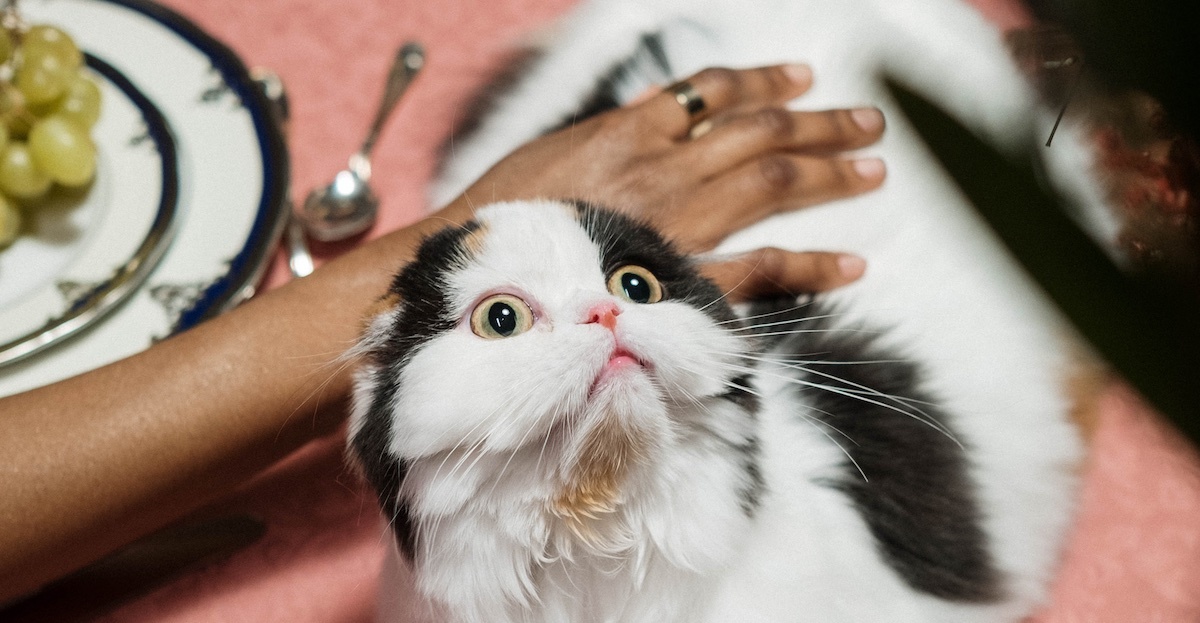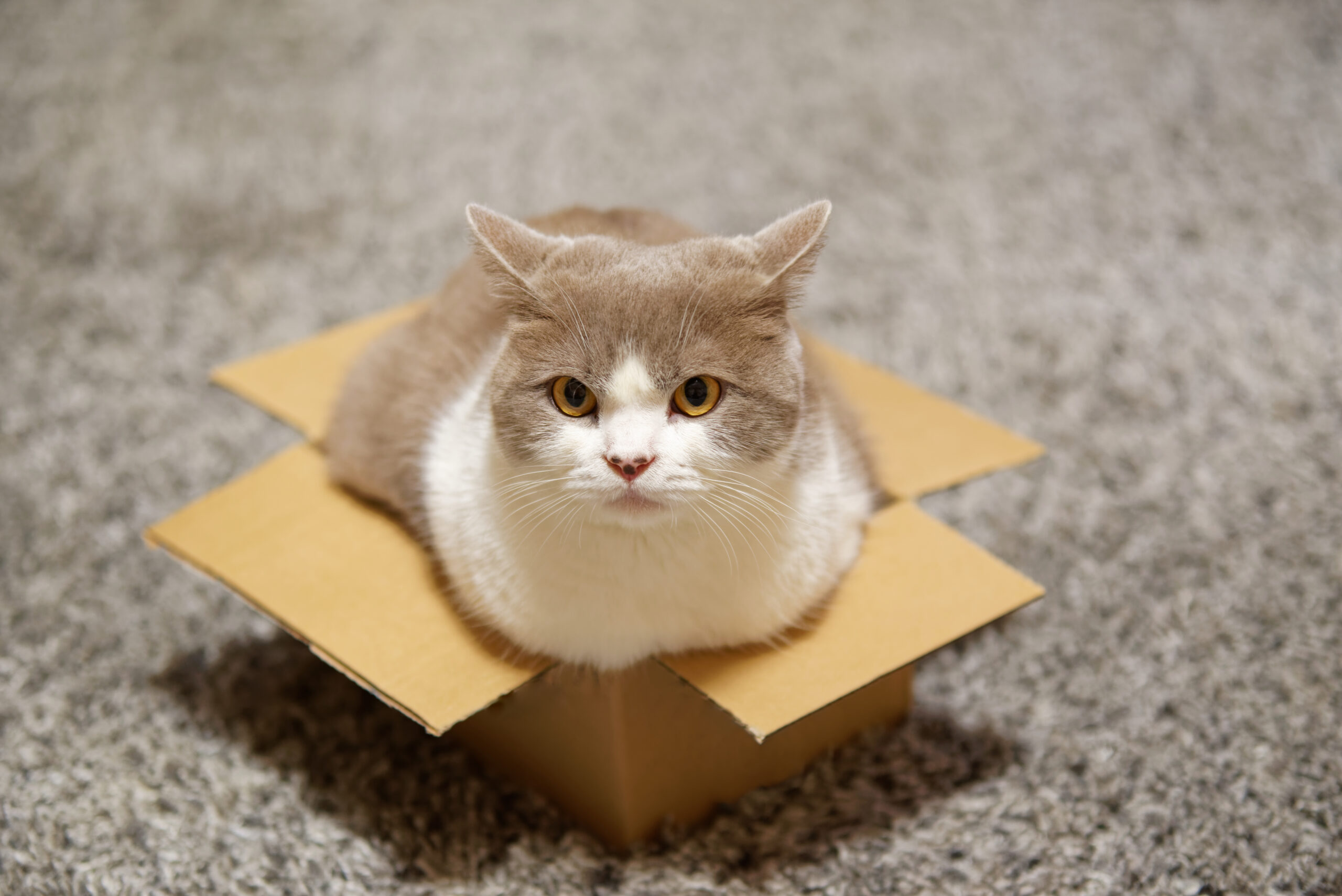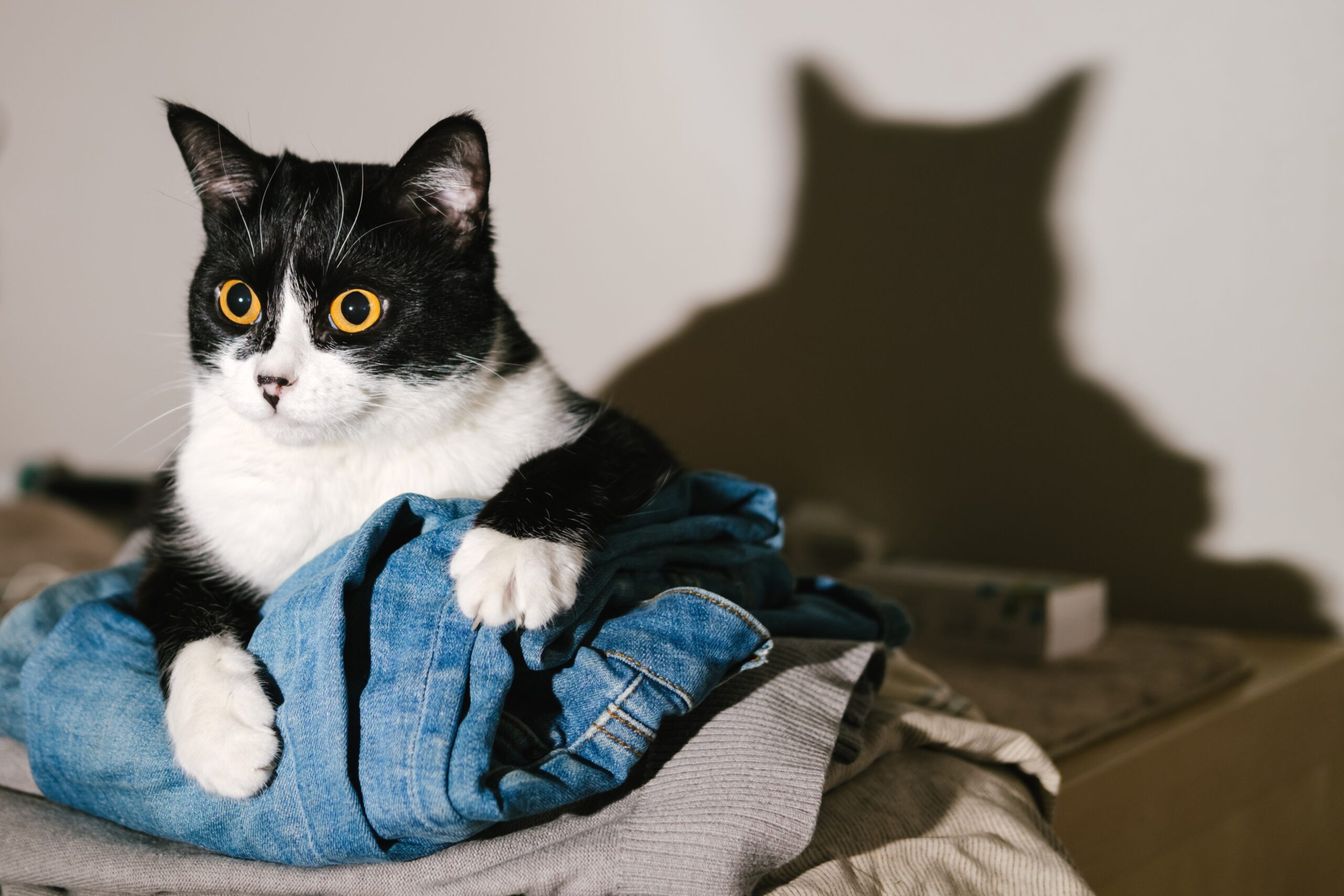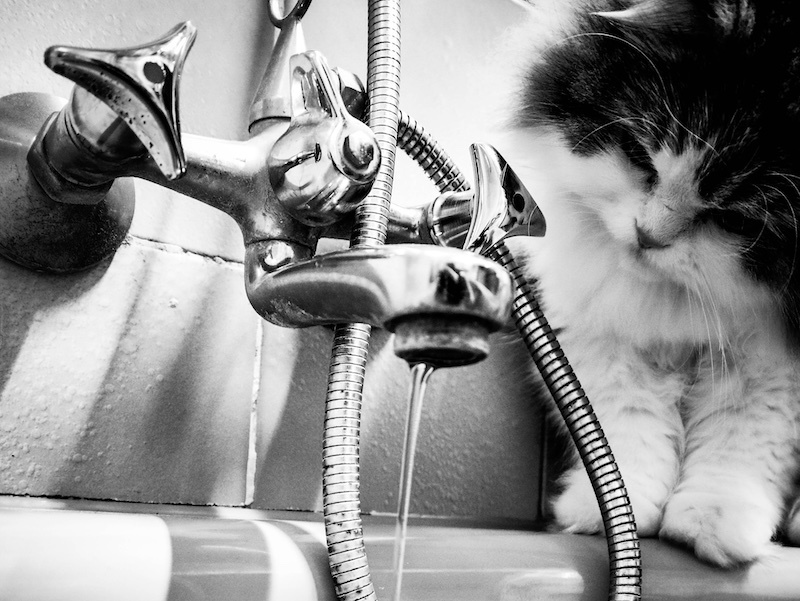13 Weird Cat Behaviors, Explained
Why do our feline friends act freaky?

Why do our feline friends act freaky?

If you’re a cat lover, you know that deep down these four-legged furballs are just little weirdos.
What seems peculiar to us is perfectly normal to our feline friends. Squeezing into incredibly small spaces or empty Amazon boxes? Grooming your hand with their sandpaper-like tongue? Knocking random things off the counter, just because? It’s all part of a day’s work for your cat.
You might never fully comprehend what your kitty is up to, but it is possible to decode some of their eccentricities. We spoke to Frank D. McMillan, DVM, and director of Well-Being Studies at Best Friends Animal Society, to help unpack some cat behaviors and quirks.
Your cat stares out the window, fixated on the birds in the yard. Listen carefully and you’ll probably hear chirps and teeth chatters that sound almost like the noises a bird or rodent might make. (Don’t know what we’re talking about? Here’s an entire Instagram account dedicated to this enigmatic chirp.)
The sound can be a little unnerving. Your kitty is making this noise because they cannot get to its prey—and they’re a bit frustrated.
They also might make chewing or biting movements with their mouth in anticipation of the kill; Dr. McMillan says this is completely normal behavior. After all, your feline—if left to roam on their own outdoors—is essentially a mobile bird-killing machine.
In the evening, when everyone is ready for bed, nocturnal felines get especially frisky. It’s a cat’s way of discharging pent-up energy, and it feels good. Cats sleep 12 to 16 hours a day, with their main burst of energy arriving in the nighttime hours. That’s because their wild ancestors would do most of their hunting at night.
“It stems from instinct, when all kinds of cats—lions, tigers, and your Fluffy—are on the hunt,” McMillan says. “If it disturbs your slumber, try exercising your cat during the day. It’s a good way to avoid those random sprints throughout the house in the middle of the night.”
Some cats may lick your hands with their sandpapery tongues or nibble on your fingers. Whether you find it pleasant or uncomfortable depends on the individual.
“It could be a sign of affection or because your cat likes the salty taste of your skin,” says McMillan, though he doubts it’s the latter, since cats aren’t typically drawn to salty foods. “Some veterinarians say it’s a comforting behavior for the cat.”
We do know that cats groom their littermates and other cats they’ve bonded with. It’s reasonable to assume that if your cat gives you a “bath,” it’s coming from a place of love, affection, and trust. Sometimes, love hurts.
If you live with a cat, you know to never ever leave anything breakable or of value on a flat surface. It’s too tempting to a cat. If your cat can get to it, the odds are high they’ll knock it off, and won’t even feel guilty about it.
McMillan assures us your cat isn’t being bad (though they may be knocking things over to get your attention). “The cat may be curious or bored,” he explains. Cats’ prey drive encourages them to explore their surroundings. A cat’s paws are highly sensitive, so by moving and touching an object, they are getting lots of information and feedback.
To break your cat of this naughty habit, try introducing new toys to engage your cat’s brain. Be sure to regularly play with your cat. While you’re at it, try to clear surfaces of breakables as best as you can: Cats are gonna cat.

Present your furry friend with a fluffy, king-size mattress, or an overpriced luxury cat bed—and they may still opt to chill in a cardboard box that’s destined for the recycling bin.
What explains the low-budget taste?
Your cat is choosing the smaller and what appears to be the less comfortable space over one where they can spread out. It’s because small, enclosed spaces make your cat feel secure from all angles. “Think of it as if she’s in the wild,” McMillan says. “She wouldn’t sleep in an unprotected, open area where predators could harm her. A small space where she can hide is ideal.”
If your cat goes outdoors—or has a basement to hunt in—they might regularly bring you trophies of dead mice, birds, bugs, or other animals. Believe it or not, it’s a sign of thanks.
In bringing you a fresh kill, your cat is sharing the rewards of the hunt with you. If you’re turned off by this behavior (and who wouldn’t be?), put a bell on your outdoor cat’s collar to alert prey that your cat is on the hunt, so that the mouse or bird stands a slightly better chance at survival.
Kittens knead on their mother’s teats while feeding to stimulate milk flow.
Once they’re weaned, they may continue to knead on you, their human, because it’s such a pleasant and soothing feeling. Cat lovers refer to this phenomenon as “making biscuits” or “making pizza”—because it really does look like your kitty is working a bit of dough.
Plus, when cats knead, they release their scent from glands in the pads of their paws to transfer that scent onto you. They’re marking you as their territory so there’s no confusion about your feline loyalties. Doesn’t it feel good to be kneaded?
To a cat, these behaviors are physical ways to say “thank you.” When your cat rams his head into you—fun fact, it’s actually called “head bunting”—it means he feels safe and comfortable.
Cats also head bunt each other to create social bonds. It’s a way mix their scents to create one familiar scent, which is distributed to all of the other cats in your home, or distributed among an outdoor cat colony. Pretty cool.
Meanwhile, if you see your cat rolling around on the floor and exposing their tummy on the floor, they’re saying they trust you. Ditto if they behave in a similar manner around other cats. A cat’s tummy is their most vulnerable place on their body, so by rolling over and asking for belly rubs, your cat is demonstrating how safe and secure they feel around you.
You might think you own your cat. In a cat’s world, it’s actually you who is owned by the cat. Go figure!
Rubbing up against you is a perfect example of the cat’s understanding of their relationship with their humans. When your cat rubs up against you, they’re emitting pheromones that have a calming effect on your cat; some veterinarians believe your cat is marking their territory—which is you.
You might notice after you’ve been out for the day or after a shower your cat might rub against you more than usual. This might be because they are trying to restore your smell back to how it should be—cat-scented, of course.
You gently pour food in the bowl only to watch your cat grab it with their paws and commence batting pieces of it all over the kitchen floor. It’s messy, and frankly rude (don’t they know how much that grub costs?).
They’re doing this because they’re tapping into their hunting instincts. You’ll also see this behavior when they have a toy, or are about to pounce on an insect inside the house. Your domestic cat’s hunting instinct is still intact, which is good news if your home ever experiences a pest issue.

It’s a bit creepy when your cat stares at you, or the wall, seemingly fixated on something you can’t see.
According to a study from City University London in England, cats (and other animals) may be able to see in ultraviolet (UV) light, which means they can detect subtle motion and spectrums of light that we can’t see. “Nobody ever thought these animals could see in ultraviolet, but in fact, they do,” said Ron Douglas, a biologist who headed up that study.
Having this ability allows cats to see things we cannot. The lens in our eyes block UV rays. (People who have had cataract surgery, where the lens in our eyes are removed, report seeing UV rays.)
The aforementioned study suggested that the ability to see UV light is beneficial to some animals. Bees, for instance, can see colored patterns that draw them to nectar.
So that mysterious staring? Your cat might be picking up on colors and patterns that are invisible to the human eye.
Have you ever noticed your cat looking at you and gently blinking? It’s their way of showing affection and relaxation. An alert cat will keep their eyes wide open, taking in their surroundings, with quick, infrequent blinks. Slow blinking means that your cat is completely comfortable, and feels safe enough to let their guard down.
Adorable pro tip: You can send that affection back to her by looking in your cat’s direction while slowly opening and closing your own eyes.

You may have noticed that your cat likes to quench their thirst from a running faucet, a freshly flushed toilet, or from that glass of water you just poured for yourself. What gives?
Well, running water simply tastes better to cats. Even if you diligently replace your cat’s water bowl every day, there’s no way it tastes as fresh as clean, running water. Wild cats also gravitate towards running water as opposed to stagnant ponds, because running water is less likely to be contaminated with bacteria and disease.
Now, if your cat sees every glass of water an open invitation to hydrate, the reasoning is two-fold: first of all, like we mentioned above, that glass of water is probably fresher than the water in their bowl, and also, cats hate getting their whiskers wet, and the narrower opening of a cup helps them keep their pretty faces dry while drinking.
If you have a fickle feline, consider ordering a cat drinking fountain. A fountain keeps fresh water flowing for your cat all day long, which will encourage them to drink more and stay healthy and hydrated.
For all your cat’s funky behaviors, we know you wouldn’t have it any other way. After all, even if they act like they run the show, or make weird chattering noises, or try to break your favorite coffee mug—they depend on your TLC. And there’s no better way to care for your cat than to make sure they’re as healthy as possible.
Pet insurance for your cat, like coverage offered by Lemonade, can help take the hiss out of unexpected vet bills. Plus Lemonade offers a number of preventative packages and add-ons to help cover routine care, as well as other issues that might come up.
Applying for pet insurance is fast, and so easy that your cat might be able to do it. (Don’t let your cat do it.)
Please note: Lemonade articles and other editorial content are meant for educational purposes only, and should not be relied upon instead of professional legal, insurance or financial advice. The content of these educational articles does not alter the terms, conditions, exclusions, or limitations of policies issued by Lemonade, which differ according to your state of residence. While we regularly review previously published content to ensure it is accurate and up-to-date, there may be instances in which legal conditions or policy details have changed since publication. Any hypothetical examples used in Lemonade editorial content are purely expositional. Hypothetical examples do not alter or bind Lemonade to any application of your insurance policy to the particular facts and circumstances of any actual claim.